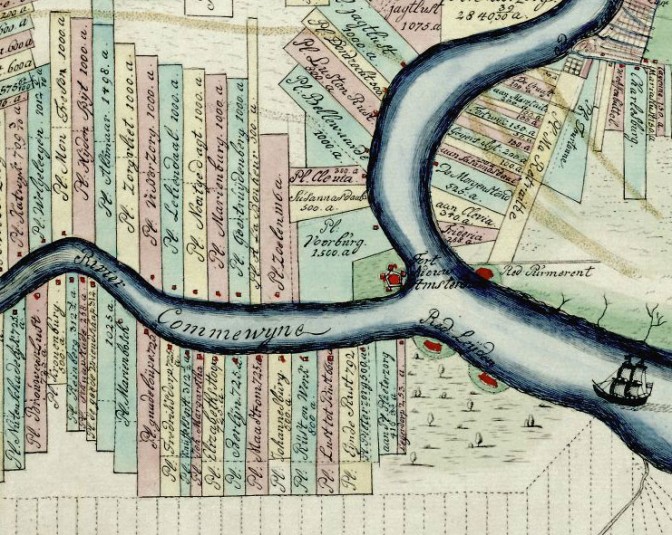A new website is available: The Dutch in the Caribbean World C. 1670-C. 1870. The website has a guide to archival sources on the Dutch colonies in the Caribbean World and a summary of the relevant laws and regulations of the period. The references cover collections in the Netherlands, the United Kingdom, Curaçao, Suriname and Guyana, especially those that might contain information about slavery and multicultural relations.

Map of plantations in Suriname (Nationaal Archief, 4.VEL nr. 1679A)
Examples of genealogical sources
Some examples of genealogical sources that are mentioned on this website:
- Registers of Baptism, Marriage and Burial in Suriname, 1662-1838
- Registers of intentions to marry and marriages of the Dutch Reformed Church, Curaçao, 1714-1822
- Baptismal register of Portuguese Jews (men). With annotation of the dates of death, Curaçao, 1722-1830
- Deposited sealed last will and testaments, Saint Martin, 1753-1813
- List of names of civil servants, clergymen, and owners and directors of plantations, the acreage of plantations and numbers of slaves in Essequibo and Demerara, 1769
- List of slaves over five years old belonging to freemen in the colony of Berbice, Berbice, 1780-1800
- Alphabetical list of persons who are appointed as ‘street guardians’ over the slave children, Paramaribo, Suriname, 1825-1840
- List of persons of European origin who died on St Eustatius, 1827-1828
- Account of arrears of land tax (bundergeld) on Aruba for the period 1871 – June 1875 for individuals who are deceased, abroad or impecunious, Aruba, 1871-1875
Finding the actual records
The sources in the examples above can be found at the Nationaal Archief, the National Archives of the Netherlands in The Hague. The Dutch in the Caribbean world website limits itself to references to archives, scans of the actual documents are not available there.
The reference will have this form: NL HaNA 1.05.05 343, where NL HaNA is the code for the National Archives in The Hague, 1.05.05 is the catalog reference and 343 is the call number. You can request those documents from the National Archives’ website gahetNA by going to the Rapid Reservations form, type in the numbers and select “Show in archive inventory”. This will take you to the description of this record in the National Archives catalog.
In some cases, the record is scanned and you will be able to access these scans online by selecting the “Scans” tab. If scans are not available online yet, you can order scans to be made via the gahetNA website (you need to create an account first and then add them to your shopping basket) or reserve them for consultation in the reading room in The Hague. Alternatively, you can hire a professional genealogist to consult these records for you and translate them into English since the originals are mostly in Dutch.

